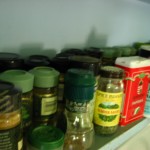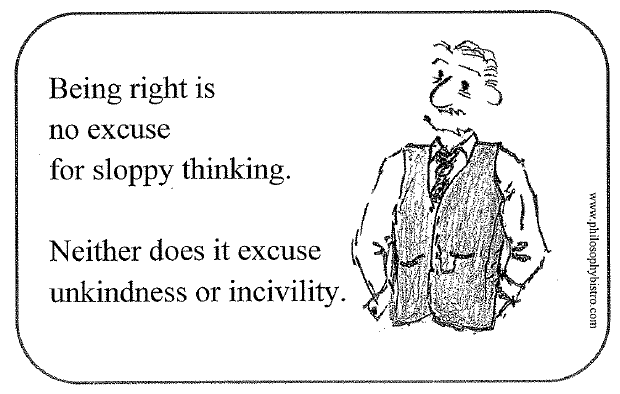Sing to me, oh Muse!
Sing  to me of fierce fire tamed,
to me of fierce fire tamed,
and made to humbly do our bidding;
Of strangers drawn unto its warmth,
to make and eat and become a people.
Sing to me of sweet earth’s bounty,
harvested and shaped and changed;
Of food upon the open table,
to fill the gut and feed the heart.
 Sing to me of precious salt,
Sing to me of precious salt,
wrested from deep earth and sea;
Of herbs and roots, of leaves and spice,
to season the plate and gladden the sense.
Sing to me of spoiling turned tool,
and rot to flavour and preserve;
Of fermentation in riotous rot,
bringing bread and beer, pickles and cheese.
Sing to me of roasting and baking,
of stewing and frying.
 Sing to me of bread, precious bread,
Sing to me of bread, precious bread,
combining fire with plant and salt and yeast.
Sing to me, oh Muse!
Sing to me of the cook.
Around the Bistro this week, we have been keeping busy. Wode Toad has been hazing/harassing the new guy, Brandon, we’ve been doing some spring cleaning, and Pierce brought in a new book: Cooking, by Michael Pollan. He is probably the most influential food writer of our times, and a champion of real food as opposed to processed food–both from factories and factory farms. It seems strange that it has taken him this long to establish a connection between food and the cooking of food, but in this lively, entertaining, and occasionally overstated book, he examines cooking and learns to cook. This has generated a great deal of discussion in the Bistro’s kitchen, and it occurred to me that, in spite of the fact that we are a bistro and I share weekly recipes and many of my illustrations center around food, I hadn’t actually written about cooking.
It occurred to Wode Toad that my weekly essays have been ![]() steadily growing longer, or, as he says about brevity: “Och, I don’t know abou’ the soul of wit, Bear, but with your writings as with briefs, the less I see of them, the better, Aye?”
steadily growing longer, or, as he says about brevity: “Och, I don’t know abou’ the soul of wit, Bear, but with your writings as with briefs, the less I see of them, the better, Aye?”
Observing that I loved to eat (a doctor once pointed out that my sister as an infant displayed tremendous “hand to mouth coordination”–a family trait), my mother convinced me that there was a natural relationship between cooking and eating, and that if I wished to eat well, I should learn to cook well. I agreed, and asked if she’d teach me. She said yes, the first thing you need to learn is how to wash dishes, which she then made me do.
The lesson, however, was not lost on me; I learned to cook because I wanted to eat. After my first kidney transplant, I had to control my diet (and my budget), so I learned to bake my own bread and to cook from scratch and from fresh ingredients. Because my daughter likes good food, she learned to cook, and will probably soon surpass my skills. With a few exceptions, most of my friends cook, and cook very well.![]()
ahem.
I cook because I need to eat.
I cook healthy food because I need to eat healthy food.
I cook well because I like to eat well.
I cook because I need to create.
Most of us work jobs that don’t actually produce anything, and where nothing is actually ever finished–it just keeps starting over again. Most of us live in worlds that our outside of our control. In the kitchen, I have control, I am producing something, and, at the end of it, I am actually done. I can look at it, and–Godlike–say: ‘it is good.’
I cook because it keeps me busy.
Due to a variety of circumstances last fall, I spiraled into a deep blue funk, a slough of despond, a dark night of the soul, a dark forest, a depression. To keep me from sitting and staring, I made myself cook every day, even though I had lost my appetite. Because of this, I gave a lot of it away. “Well,” my friend Amy said, “even if you are still depressed, at least you’ll be very popular and depressed.”
I cook because it is handiwork.
I live in a world of words. I sell words at one job, and guide students through words at the other. Everything I do is so verbal. Don’t get me wrong, I am at home in the world of words. But one of the great pleasures of cooking is that it is working with my hands (and smell, and sight and taste, etc.) rather than with words. It is to me what Zen meditation and running are to many others. Because of this, however, it is hard to explain why I love it so: like music, it defies words. It is my own quiet time.
This doesn’t mean that I would not occasionally like help.
In fact, one of my greatest regrets is that I have never really figured out how to cook well with others. I have worked in commercial kitchens, and I love the camaraderie, but I tend to be alone in the kitchen. Even when I do get a chance to cook with somebody–usually my daughter–we tend to bump into each other because we each are used to having the kitchen to ourselves. If you are just starting to cook, or if you are just starting a relationship, my advice would be to learn to cook together.
I cook because it connects me with our food.
I know each piece, because I found it, brought it home, cleaned it, and prepared it. My food belongs to me, and is not just a product; I know it intimately.
But I also cook because I love.
I am not a person who feels comfortable expressing affection–or even emotion, for that matter–but cooking is an acceptable, safe way of telling somebody that I love them.
There is something strangely satisfying in getting up several hours before I need to in order to cook my wife breakfast for her birthday, or to make muffins for the intrepid New York travellers to take to Brooklyn, or to leave bread on somebody’s mailbox, or lean in and hand it to them in the middle of a conversation. I think of the people I am cooking for, and this happiness permeates the experience of cooking.
So, go cook something yourself.
Make yourself something to eat,
then make someone you love something to eat,
then convince that person to cook with you.
And remember to drop by the Philosophy Bistro for recipes and discussion.





